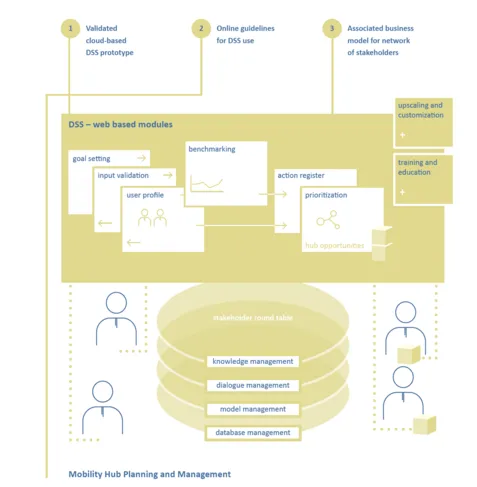SOUL – Smart mobility hub platform
An EIT Urban Mobility KIC project
Research focus: User Experience and Human Centered Design in Mobility Hub Planning
Professorship of Urban Design, Prof. Dr. Benedikt Boucsein
Initially deployed at the TU München Chair of Industrial Design the project is followed up at the Professorship of Urban Design within TUM from October 2020.
Contact person: Marco Kellhammer, M.Sc. Industrial Design;
marco.kellhammer(at)tum.de, T.: +49 (0) 89 289 22550
Lead: Fondazione Politecnico di Milano
in cooperation with:
City of Milan; City of Barcelona; City of Eindhoven; ENEA; TUM; AALTO; SKODA; MOL
Duration: January 2020 – December 2020
Funded by: EIT Urban Mobility Innovation
See more information on project page of Fondazione politecnico di Milano
SOUL – Smart mobility hub platform – focuses on the question: How might we enable collaborative and knowledge-based decision making for planning and managing urban mobility hubs? Future urban mobility systems are characterized by multifaceted modes of transport, combining active modes like walking and cycling with mobility as a service options including public transport. Mobility hubs play an important role in making services accessible, meeting user’s needs and enabling seamless interchanges in between modalities respecting the spatial, cultural and societal dimensions of the local urban environment.
SOUL started as an EIT Urban Mobility Early Bird Project in 2019 pointing out the usefulness and usability gaps cities have highlighted in existing decision support systems (DSS) during the previous years.
In 2020 phase, the main task is the concept and design of a DSS framework addressing relevant stakeholders’ needs in planning and management of mobility hubs. The software aims to provide state of the art data exploitation, information processing and knowledge management in combination with a transdisciplinary communication approach.
The proposed extension phase in 2021 wanted to test and validate the technology and data approach that is developed in the SOUL project in real case studies by engaging municipalities, urban and traffic planners, as well as other public and private stakeholders specific to the respective case study of the three cities of Barcelona, Eindhoven and Milan. To simulate the use of the DSS and to actively engage stakeholders, the Urban Design Research Studio methodology will be applied to the question how DSS can be used in planning processes around mobility hubs.
The project ended after the first phase and was no longer funded by EIT UM.
